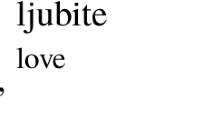Abstract
This article analyzes the grammaticalization of adjectives into prefixes in Dutch and French. In the first part, the notion of ‘affixoids’, hybrid elements that combine properties of free lexemes and bound morphemes, will be defined and illustrated. It will be claimed that affixoids can be seen as a result of a grammaticalization process for which we will advance phonological, morphological, semantic and distributional parameters applying to the evolution of adjectives into prefixes. The second part will be devoted to a specific case study in which these grammaticalization parameters will be applied to the Dutch adjectives oud ‘old’ and nieuw ‘new’ and their French counterparts ancien ‘old’ and nouveau ‘new’ when used in word-formation. More particularly, we will examine whether these adjectives may develop prefix-like properties when embedded in a compound structure and determine their degree of grammaticalization.
Similar content being viewed by others
References
Abeillé A., Godard D. (2004) Les adjectifs invariables comme compléments légers en français. In: François J. (eds) L’adjectif en français et à travers les langues. Presses Universitaires de Caen, Caen, pp 209–224
Amiot, D. (2004). Préfixes ou prépositions? Le cas de sur-, sans-, contre- et les autres. Lexique, 16. La formation des mots: horizons actuels, 67–83.
Amiot D. (2005) Between compounding and derivation: Elements of word formation corresponding to prepositions. In: Dressler W.U., Kastovsky D., Pfeiffer O.E., Rainer F. (eds) Morphology and its demarcations. Selected Papers from the 11th Morphology Meeting, Vienna, February 2004. John Benjamins, Amsterdam, pp 183–195
Bauer, L. (2005). The borderline between derivation and compounding. In W. U. Dressler, D. Kastovsky, O. E. Pfeiffer, & F. Rainer (Eds.), Morphology and its demarcations. Selected Papers from the 11th Morphology Meeting, Vienna, February 2004 (pp. 97–108). Amsterdam: John Benjamins.
Blom, C. (2005). Complex predicates in Dutch. Synchrony and diachrony. PhD Thesis, Landelijke Onderzoekschool Taalwetenschap, Amsterdam.
Booij, G. (2005a). Compounding and derivation: Evidence for construction morphology. In W. U. Dressler, D. Kastovsky, O. E. Pfeiffer, & F. Rainer (Eds.), Morphology and its demarcations. Selected Papers from the 11th Morphology Meeting, Vienna, February 2004 (pp. 109–132). Amsterdam: John Benjamins.
Booij G. (2005) The grammar of words (Oxford Textbooks in Linguistics). Oxford University Press, Oxford
Booij G. (2008) Composition et morphologie des constructions. In: Amiot D. (eds) La composition dans une perspective typologique (Etudes linguistiques). Artois Presses Université, Arras, pp 49–73
Booij G., van Santen A. (1998) Morfologie. De woordstructuur van het Nederlands (2nd ed.). Amsterdam University Press, Amsterdam
Bybee J.L. (1985) Morphology. A study of the relation between meaning and form (Typological studies in Language 9). John Benjamins, Amsterdam
Corbin D. (2001) Préfixes et suffixes: du sens aux catégories. French Language Studies 11: 41–69
De Caluwe, J. (1990). Complementariteit tussen morfologische en syntactische benoemingsprocédés. In J. De Caluwe (Ed.), Betekenis en productiviteit. Gentse bijdragen tot de studie van de Nederlandse woordvorming (Studia Germanica Gandensia 19) (pp. 9–25). Gent: Seminarie voor Duitse taalkunde, Rijksuniversiteit Gent.
Dubois J. (1962) Étude sur la dérivation suffixale en français moderne et contemporain. Librairie Larousse, Paris
Dubois J., Dubois C. (1971) Introduction à la lexicographie: le dictionnaire (Langue et langage). Librairie Larousse, Paris
Fleischer W. (1969) Wortbildung der Deutschen Gegenwartsprache. VEB Bibliographisches Institut, Leipzig
Grevisse M. (2001) Le bon usage (13th ed.). De Boeck-Duculot, Paris
Gross G. (1996) Les expressions figées en français. Noms composés et autres locutions (Collection L’essentiel français). Ophrys, Gap/ Paris
Hopper, P. J. (1991). On some principles of grammaticization. In E. Traugott & B. Heine (Eds.), Approaches to grammaticalization, Vol. I: Focus on theoretical and methodological issues (pp. 17–35). Amsterdam/Philadelphia: John Benjamins.
Hopper P., Traugott E. (1993) Grammaticalization. Cambridge University Press, Cambridge
Huchon M. (2002) Histoire de la langue française. Le livre de Poche, Paris
Kühnhold I., Putzer O., Wellmann H. (1978) Deutsche Wortbildung, Vol. III: Das Adjektiv. Düsseldorf, Schwann
Lehmann C. (1995) Thoughts on grammaticalization. München, Lincom Europa
Marchand H. (1969) The categories and types of present-day English word-formation. A synchronic- diachronic approach (2nd ed.). München, Beck
Marchello-Nizia C. (2006) Grammaticalisation et changement linguistique (Champs linguistiques). Bruxelles, De Boeck
Meesters G. (2004) Marginale morfologie in het Nederlands: paradigmatische samenstellingen, neoklassieke composita en splintercomposita (Studies op het gebied van de Nederlandse taalkunde). Koninklijke Academie voor Nederlandse Taal- en Letterkunde, Gent
Noailly M. (1999) L’adjectif en français (L’essentiel). Ophrys, Paris
ten Hacken, P. (2000). Derivation and compounding. In G. Booij, C. Lehmann, J. Mugdan, & S. Skopeteas (Eds.), Morphologie/ Morphology. Ein internationales Handbuch zur Flexion und Wortbildung/ [An International handbook on Inflection and Word Formation] (Vol. 1, pp. 349– 360). Berlin: de Gruyter.
Van Goethem, K. (2006). La grammaticalisation comme paramètre en linguistique comparative. Le cas de l’emploi préverbal des prépositions du français et du néerlandais. PhD Thesis. KULeuven, Subfaculteit Taalkunde.
Van Goethem K. (2008) La préverbation en français et en néerlandais: un cas de composition ou de dérivation?. In: Amiot D. (eds) La composition dans une perspective typologique (Etudes linguistiques). Artois Presses Université, Arras Cedex, pp 143–160
Author information
Authors and Affiliations
Corresponding author
Additional information
Kristel Van Goethem is a Postdoctoral fellow of the Research Foundation-Flanders (FWO)
Rights and permissions
About this article
Cite this article
Van Goethem, K. Oud-leerling versus ancien élève: A Comparative Study of Adjectives Grammaticalizing into Prefixes in Dutch and French. Morphology 18, 27–49 (2008). https://doi.org/10.1007/s11525-008-9121-6
Received:
Accepted:
Published:
Issue Date:
DOI: https://doi.org/10.1007/s11525-008-9121-6




